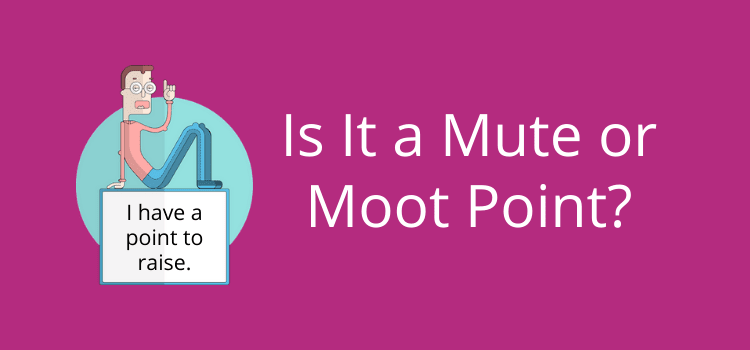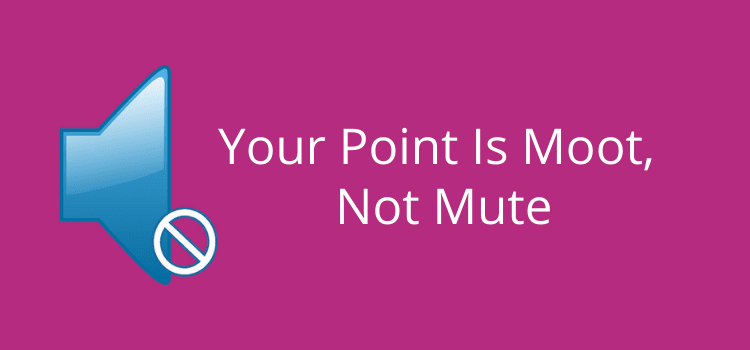
Is it a moot point or a mute point? The correct answer is a moot point.
We use the word mute to mean silent or unable to speak. You use a mute button to silence a television or computer.
But moot, as an adjective, means having little or no practical relevance. Moot can also mean something is subject to uncertainty, open to debate, or dispute.
When we say that a point is moot, we mean that an issue or fact is uncertain or irrelevant, but it is certainly not silent.
Origins of a moot point
The word moot is an adjective, noun, and verb.
Its origins date back to the 11th century and are from the Old English word mōt, meaning an assembly or meeting. The word mōtian meant to converse.
During Anglo-Saxon and medieval times, a moot was an assembly for debate or a meeting of people with a common interest.
In law, a moot was a mock trial or legal proceeding for training and practice in developing legal arguments.
A moot court dates from the mid-16th century and is still in use today.
Here is a modern definition according to Wikipedia.
Moot court is a co-curricular activity at many law schools. Participants take part in simulated court or arbitration proceedings, usually involving drafting memorials or memoranda and participating in oral argument.
In most countries, the phrase “moot court” may be shortened to simply “moot” or “mooting”. Participants are either referred to as “mooters” or, less conventionally, “mooties”.
Yes, there are some uses for the word as a noun in modern English; however, most relate to law.
We use the adjective more commonly to say that a point, question, or subject is irrelevant, open to debate or dispute, and is a moot point.
When an idea is mooted

As a verb, we use moot to talk about something that we expect is going to happen.
You often see the word used in newspaper headlines.
The government is mooted to escalate income tax rates.
The project was first mooted in November 2020.
The Prime Minister mooted the increase in May last year.
The treasurer mooted that an election may be necessary.
When the idea was first mooted, there was little interest from the public.
He mooted a change in the rules was forthcoming.
Moot is a transitive verb, so it requires an object to receive the action.
You often see it in the past tense. However, it is most commonly used in the passive form.
Moot as an adjective

By far, the most frequent use of the word is as an adjective.
But when we say something is moot, the meaning can sometimes cause confusion.
In British English, moot means to be open to debate or confusion and often ends without producing a resolution.
But in American English, the word has the sense that it is something irrelevant or unusable because it has no solution or clarity.
While both meanings share some similarities, you need to take some care to make sure that your readers understand your point.
If you are a doctor, whether you like your patients or not is a moot point.
After losing his job, the idea of buying a new house became moot.
They said it was now a moot issue, as far as they were concerned.
Whether you prefer the Beatles or the Rolling Stones is a moot point.
The plans for the concert were rendered moot after two band members were arrested.
The adjective has many uses, but by far, the most frequent use is in the expression, a moot point.
Always check fixed expressions
There are many common expressions we use that are so easy to get wrong.
Most of the time, it is because of homonyms or words that sound almost the same.
In this case, moot and mute sound quite similar.
But there are many others, including:
Wet and whet
The problem is that a spelling or grammar checker won’t find an error because the spelling of the words is correct.
That’s why you always need to check the whole expression to ensure you use it correctly.
Summary
You will rarely use this expression in your writing, but your readers will notice if you get it wrong when you do.
But now you know the correct form of the expression; you’ll get it right every time.
However, if you never use it in your writing, I suppose it becomes a somewhat moot point.
Related reading: Morning Suit And Mourning Suit – Are Both Of Them Correct?



